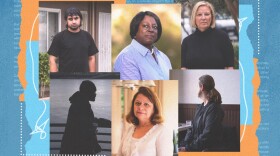STEVE INSKEEP, host:
General David Petraeus says he's leaving Iraq better than he found it. Petraeus handed over command earlier this week, and he said the average number of attacks was down from 180 per day, at the height of the violence, to an average of about 25 a day now. But insurgents still retain the ability to carry out devastating strikes, and every now and then, one of those seemingly faceless, nameless tragedies turns personal. This is one of those stories. It happened this past weekend. Four Iraqis working for a popular television cooking show were killed. A member of NPR's Baghdad bureau was supposed to be with them. NPR's Iraq correspondent Lourdes Garcia-Navarro has the story.
LOURDES GARCIA-NAVARRO: For a month every year, our cook Walid Hala (ph) becomes a TV star.
(Soundbite of TV show "Your Meal is On Us")
GARCIA-NAVARRO: The show is called "Your Meal is On Us," and Walid guest chefs on it since it started several years ago.
Unidentified Woman: (Arabic Spoken)
GARCIA-NAVARRO: The show is only on during the holy month of Ramadan when Muslims fast during the day. The concept is simple but powerful. Pick a different needy family each day and cook dinner for them. The families get to invite all their friends and relatives, and they also get gifts and money. Broadcast on an Iraqi satellite channel, it's popular feel-good holiday TV fare here. Walid says he looks forward to being a part of the program every year.
WALID HALA: (Through Translator) We bring happiness to poor families who have suffered. Some people break down in tears of joy.
GARCIA-NAVARRO: Last Saturday, Walid was supposed to head to Mosul to film two episodes. He didn't want to go. He knew Mosul was dangerous. He asked to stay behind, and the show decided to film with a local chef instead. About mid-morning, he got a call. Two cameramen, the driver and the TV station's Mosul bureau chief had been kidnapped and then brutally murdered. It was the crew he was supposed to have worked with. Walid was stunned and confused.
HALA: (Through Translator) What would I have been killed for? For giving people a plate of food? I should be condemned to death for that? No one in the show was involved in religion or politics. They killed the father of a family for providing a plate of food.
GARCIA-NAVARRO: And then he turned on the TV and there, eerily, he saw his face on the screen.
Unidentified Woman: (Arabic spoken)
GARCIA-NAVARRO: As the news anchor confirmed the grim news, the images of a recent episode with him in it looped over and over.
HALA: (Through Translator) It felt like a rehearsal for my death. I think I will be asking myself this question from now on. Why will I die? There should be a reason, shouldn't there? You should die for the mistakes you have committed, not for doing good like these people were.
GARCIA-NAVARRO: He imagines what it must have been like to be there. What reason could the killers have possibly given his colleagues before ending their lives?
HALA: (Through Translator) I just want to know the one who was going to kill me. What would he tell me? Before killing, is he going to tell me that I am a criminal or a traitor or an infidel or an American?
GARCIA-NAVARRO: In a country that has seen killing in its myriad awful forms, these deaths seemed to have touched a chord amongst Iraqis. The prime minister has ordered an investigation.
HALA: (Through Translator) The show has a certain meaning now. People sacrificed their lives for this show, so why should I run? I won't step back because this is something simple and good.
GARCIA-NAVARRO: Walid says he'll go back on air and cook. Lourdes Garcia-Navarro, NPR News, Baghdad.
(Soundbite of music)
INSKEEP: This is NPR News. Transcript provided by NPR, Copyright NPR.






